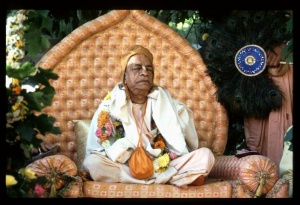CC Madhya 10.173: Difference between revisions
m (1 revision(s)) |
No edit summary |
||
| Line 1: | Line 1: | ||
{{ | [[Category:Sri Caitanya-caritamrta - Madhya-lila Chapter 10|C173]] | ||
<div style="float:left">'''[[Sri Caitanya-caritamrta|Śrī Caitanya-caritāmṛta]] - [[CC Madhya|Madhya-līlā]] - [[CC Madhya 10|Chapter 10: The Lord's Return to Jagannātha Purī]]'''</div> | |||
<div style="float:right">[[File:Go-previous.png|link=CC Madhya 10.172|Madhya-līlā 10.172]] '''[[CC Madhya 10.172|Madhya-līlā 10.172]] - [[CC Madhya 10.174|Madhya-līlā 10.174]]''' [[File:Go-next.png|link=CC Madhya 10.174|Madhya-līlā 10.174]]</div> | |||
{{CompareVersions|CC|Madhya 10.173|CC 1975|CC 1996}} | |||
{{RandomImage}} | |||
==== TEXT 173 ==== | ==== TEXT 173 ==== | ||
<div | <div class="verse"> | ||
guru-śiṣya-nyāye satya śiṣyera parājaya | :guru-śiṣya-nyāye satya śiṣyera parājaya | ||
bhāratī kahe,-eho nahe, anya hetu haya | :bhāratī kahe,-eho nahe, anya hetu haya | ||
</div> | </div> | ||
| Line 12: | Line 16: | ||
==== SYNONYMS ==== | ==== SYNONYMS ==== | ||
<div | <div class="synonyms"> | ||
guru-śiṣya- | ''guru-śiṣya-nyāye''—when there is a logical argument between the spiritual master and the disciple; ''satya''—certainly; ''śiṣyera—''of the disciple; ''parājaya''—defeat; ''bhāratī kahe—''Brahmānanda Bhāratī said; ''eho nahe''—in this case it is not the fact; ''anya hetu''—another cause; ''haya''—there is. | ||
</div> | </div> | ||
| Line 19: | Line 23: | ||
==== TRANSLATION ==== | ==== TRANSLATION ==== | ||
<div | <div class="translation"> | ||
Śrī Caitanya Mahāprabhu thus posed Himself as a disciple and accepted Brahmānanda Bhāratī as His spiritual master. He then said, “The disciple is certainly defeated in an argument with the spiritual master.” | Śrī Caitanya Mahāprabhu thus posed Himself as a disciple and accepted Brahmānanda Bhāratī as His spiritual master. He then said, “The disciple is certainly defeated in an argument with the spiritual master.” | ||
Brahmānanda Bhāratī immediately countered these words, saying, “This is not the cause of Your defeat. There is another cause. | Brahmānanda Bhāratī immediately countered these words, saying, “This is not the cause of Your defeat. There is another cause. | ||
</div> | </div> | ||
__NOTOC__ | |||
<div style="float:right; clear:both;">[[File:Go-previous.png|link=CC Madhya 10.172|Madhya-līlā 10.172]] '''[[CC Madhya 10.172|Madhya-līlā 10.172]] - [[CC Madhya 10.174|Madhya-līlā 10.174]]''' [[File:Go-next.png|link=CC Madhya 10.174|Madhya-līlā 10.174]]</div> | |||
__NOTOC__ | |||
__NOEDITSECTION__ | |||
Revision as of 16:05, 1 August 2021

His Divine Grace
A.C. Bhaktivedanta Swami Prabhupada
A.C. Bhaktivedanta Swami Prabhupada
TEXT 173
- guru-śiṣya-nyāye satya śiṣyera parājaya
- bhāratī kahe,-eho nahe, anya hetu haya
SYNONYMS
guru-śiṣya-nyāye—when there is a logical argument between the spiritual master and the disciple; satya—certainly; śiṣyera—of the disciple; parājaya—defeat; bhāratī kahe—Brahmānanda Bhāratī said; eho nahe—in this case it is not the fact; anya hetu—another cause; haya—there is.
TRANSLATION
Śrī Caitanya Mahāprabhu thus posed Himself as a disciple and accepted Brahmānanda Bhāratī as His spiritual master. He then said, “The disciple is certainly defeated in an argument with the spiritual master.” Brahmānanda Bhāratī immediately countered these words, saying, “This is not the cause of Your defeat. There is another cause.